Buddha, Vol 1: Kapilavastu Osamu TezukaThis is one of the great achievements of the comics medium, a masterpiece by the great ones. Artbomb.netBuddha, Vol. 2: The Four Encounters Osamu TezukaOsamu Tezuka’s vaunted storytelling genius, consummate skill at visual expression, and warm humanity blossom fully in his eight-volume epic of Siddhartha’s life and times. Tezuka evidences his profound grasp of the subject by contextualizing the Buddha’s ideas; the emphasis is on movement, action, emotion, and conflict as the prince Siddhartha runs away from home, travels across India, and questions Hindu practices such as ascetic self-mutilation and caste oppression. Rather than recommend resignation and impassivity, Tezuka’s Buddha predicates enlightenment upon recognizing the interconnectedness of life, having compassion for the suffering, and ordering one’s life sensibly. Philosophical segments are threaded into interpersonal situations with ground-breaking visual dynamism by an artist who makes sure never to lose his readers’ attention.
Tezuka himself was a humanist rather than a Buddhist, and his magnum opus is not an attempt at propaganda. Hermann Hesse’s novel or Bertolucci’s film is comparable in this regard; in fact, Tezuka’s approach is slightly irreverent in that it incorporates something that Western commentators often eschew, namely, humor.Buddha, Vol. 3: Devadatta Osamu TezukaThe Eisner and Harvey Winner
The third volume of this epic graphic novel send Siddhartha further into a world mired in pain and suffering. The journey to peace and enlightenment looms far but bright.
Prince Siddhartha quickly learns that the monk's path is covered in thorns and self-abuses much more profound than shaving your head. His new companions Dhepa and Assaji accompany him to plague-ridden town, ruled by the ravashing Visakha. On a different path filled with as many vararies is Devadatta, an orphan who learns only that bad almost always gets worse.
To strange cities, and dire prophecies...Buddha, Vol. 4: The Forest of Uruvela Osamu TezukaThe Eisner and Harvey Winner
In this fourth volume of the award-winning graphic novel biography, Buddha slowly discovers that his destiny lies in a path not readily available to him. With fellow ascetics Dhepa who has complete faith in the purifying quality of painful physical ordeals, and Assaji, who can predict everyone's death to the hour, Buddha travels through the kingdom of Magadha into the Forest of Uruvela, where The Middle Path and Enlightenment wait beyond a series of death-defying trials.
Awake under the Pippala tree...Buddha, Vol. 5: Deer Park Osamu TezukaIn the fifth installment of manga-godfather Osamu Tezuka's Buddha, engagement with death imparts the lesson of life's sancity. In a Machiavellian rise to power, Devadatta, a rogue aristrocrat, incites war between two kingdoms that will leave thousands dead. King Bimisara of Magadha, fearing death his son's own hand, withdraws fatherly love. The true measure of the Buddha's divinity will turn out to be a test of diplomacy - the power of words.Buddha, Vol. 6: Ananda Osamu TezukaIn the sixth volume of manga visionary Osamu Tezuka's Buddha, the devil Mara possesses the bandit Ananda, half-brother of Devadatta, in an effort to eliminate the Buddha. A ruthless killer who is impervious to physical harm, Ananda will retain the devil's favor only if he spurns his love interest.
When Ananda and his bandit buddy attack the Fire Shrine of the Brahmin brothers Kassapa, it is none other than the Awakened One who happens by. Buddha must confront his eternal enemy, Mara, before he can open the eyes of arrogant priests and hardened criminals.Buddha, Vol. 7: Prince Ajatasattu Osamu TezukaOsamu Tezuka’s vaunted storytelling genius, consummate skill at visual expression, and warm humanity blossom fully in his eight-volume epic of Siddhartha’s life and times. Tezuka evidences his profound grasp of the subject by contextualizing the Buddha’s ideas; the emphasis is on movement, action, emotion, and conflict as the prince Siddhartha runs away from home, travels across India, and questions Hindu practices such as ascetic self-mutilation and caste oppression. Rather than recommend resignation and impassivity, Tezuka’s Buddha predicates enlightenment upon recognizing the interconnectedness of life, having compassion for the suffering, and ordering one’s life sensibly. Philosophical segments are threaded into interpersonal situations with ground-breaking visual dynamism by an artist who makes sure never to lose his readers’ attention.
Tezuka himself was a humanist rather than a Buddhist, and his magnum opus is not an attempt at propaganda. Hermann Hesse’s novel or Bertolucci’s film is comparable in this regard; in fact, Tezuka’s approach is slightly irreverent in that it incorporates something that Western commentators often eschew, namely, humor.Buddha, Vol. 8: Jetavana Osamu TezukaOsamu Tezuka’s vaunted storytelling genius, consummate skill at visual expression, and warm humanity blossom fully in his eight-volume epic of Siddhartha’s life and times. Tezuka evidences his profound grasp of the subject by contextualizing the Buddha’s ideas; the emphasis is on movement, action, emotion, and conflict as the prince Siddhartha runs away from home, travels across India, and questions Hindu practices such as ascetic self-mutilation and caste oppression. Rather than recommend resignation and impassivity, Tezuka’s Buddha predicates enlightenment upon recognizing the interconnectedness of life, having compassion for the suffering, and ordering one’s life sensibly. Philosophical segments are threaded into interpersonal situations with ground-breaking visual dynamism by an artist who makes sure never to lose his readers’ attention.
Tezuka himself was a humanist rather than a Buddhist, and his magnum opus is not an attempt at propaganda. Hermann Hesse’s novel or Bertolucci’s film is comparable in this regard; in fact, Tezuka’s approach is slightly irreverent in that it incorporates something that Western commentators often eschew, namely, humor. |
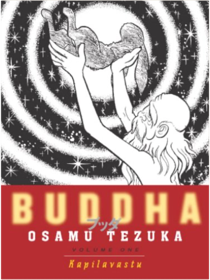
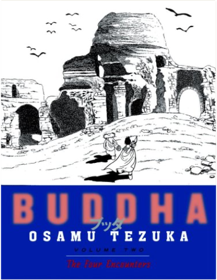
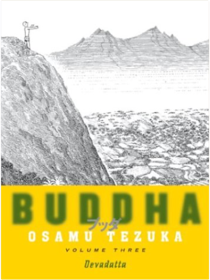
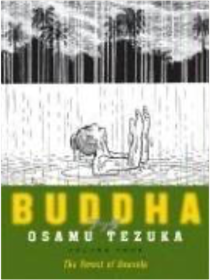
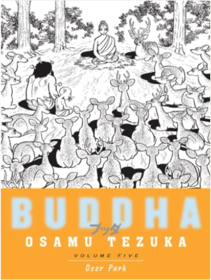
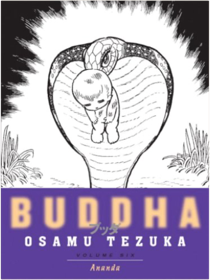
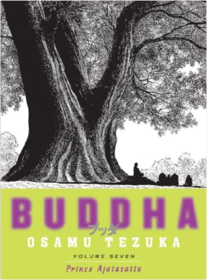
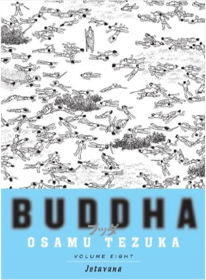


 Made with Delicious Library
Made with Delicious Library